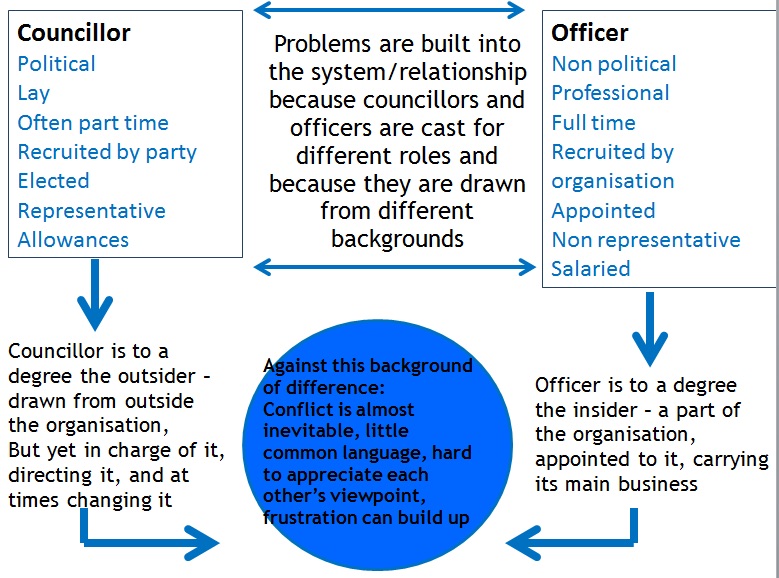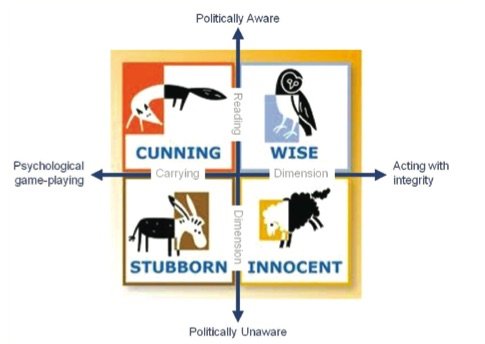
In a time of budget pressures it would be no surprise to hear relationships between members and officers are strained. Prof Catherine Staite guides us through the secrets that help make the political and managerial interface work.
If you sometimes find working with members difficult, you are not alone. It’s not at all surprising because officers and members operate in parallel universes and that is the source of much tension and many difficult situations.
The better you understand that, the better you’ll be able to navigate the treacherous waters of member/officer relationships. US academic and elected city mayor, John Nalbandian, observed how misunderstandings and conflict arise at the interface between politics and management because “councillors and officers are cast for different roles”.
Problems between officers and members cannot be blamed solely on personalities, but have more to do with the different arenas in which each operate and the different motivations which help to shape their world view, as highlighted in the diagram below.
One of the key challenges of being a member, or a senior officer, is that you are constantly challenged to see the world from the alternative viewpoint, either political or managerial.
Because the goals of officers and members are often incompatible, organisational conflict is inevitable and inherent, but it’s also important to remember it’s not, of itself neither “good” nor “bad”.
Political competence on the part of both political and managerial leaders is essential to the successful achievement of workable compromises. Politically competent managers expect resistance to their attempts to achieve the best outcomes, but nevertheless keep on using their small “p” political skills and attributes, including influencing and resilience, until they get the right results.
It’s important to remember that those tensions and conflicts — and the inevitable frustrations — do serve an important purpose. Political and managerial leadership should be collaborative but not collusive. Members and officers all need someone who can tell them when they are wrong to maintain a healthy balance between collaboration and mutual challenge.
Successful political leaders and senior officers are distinguished by their ability to construct trust, through collaborative approaches to leadership, to enable them to manage the tension and potential conflict between the different political and managerial logics.
Baddeley and James (1987) describe four types of political behaviour, which are distinguished by varying degrees of integrity and politically awareness. They use animal characteristics to describe the behaviours which help or hinder the effective management of the political and managerial interface.
A lot depends on the extent to which people are both politically aware and acting with integrity. We may hope that all senior political leaders and managers are “owls” — both politically aware and acting with integrity, but those operating at the political and managerial interface have to be prepared to recognise “foxes” and to limit the damage caused by compliant and naïve “sheep” or self-serving and politically incompetent “donkeys”.
You have an important role and invaluable expertise but that isn’t enough to ensure members will listen to your advice, no matter how right you are. Don’t forget that political and managerial logics are very different. We might like to think that everyone we work with is an ‘owl’ but we’ll all meet plenty of ‘foxes’ – as you’d expect in a political environment – and more than enough ‘donkeys’ and ‘sheep’.
The secrets of success for managing relationships with members: develop relationships of trust but don’t collude. And tell them the truth but not in a way that causes them to reject both you and the message. You are a professional but you should not try to assert your professional status by talking down to members or making them feel foolish — no good will come of it. You may need to spend more time on complex issues than you’d expect. Use questions to start difficult conversations: “How do you think we should tackle this?” rather than starting with a statement, “this is what we should do”. Enjoy!

Prof Catherine Staite is director of public sector reform at the Institute of Local Government Studies (INLOGOV), University of Birmingham.












